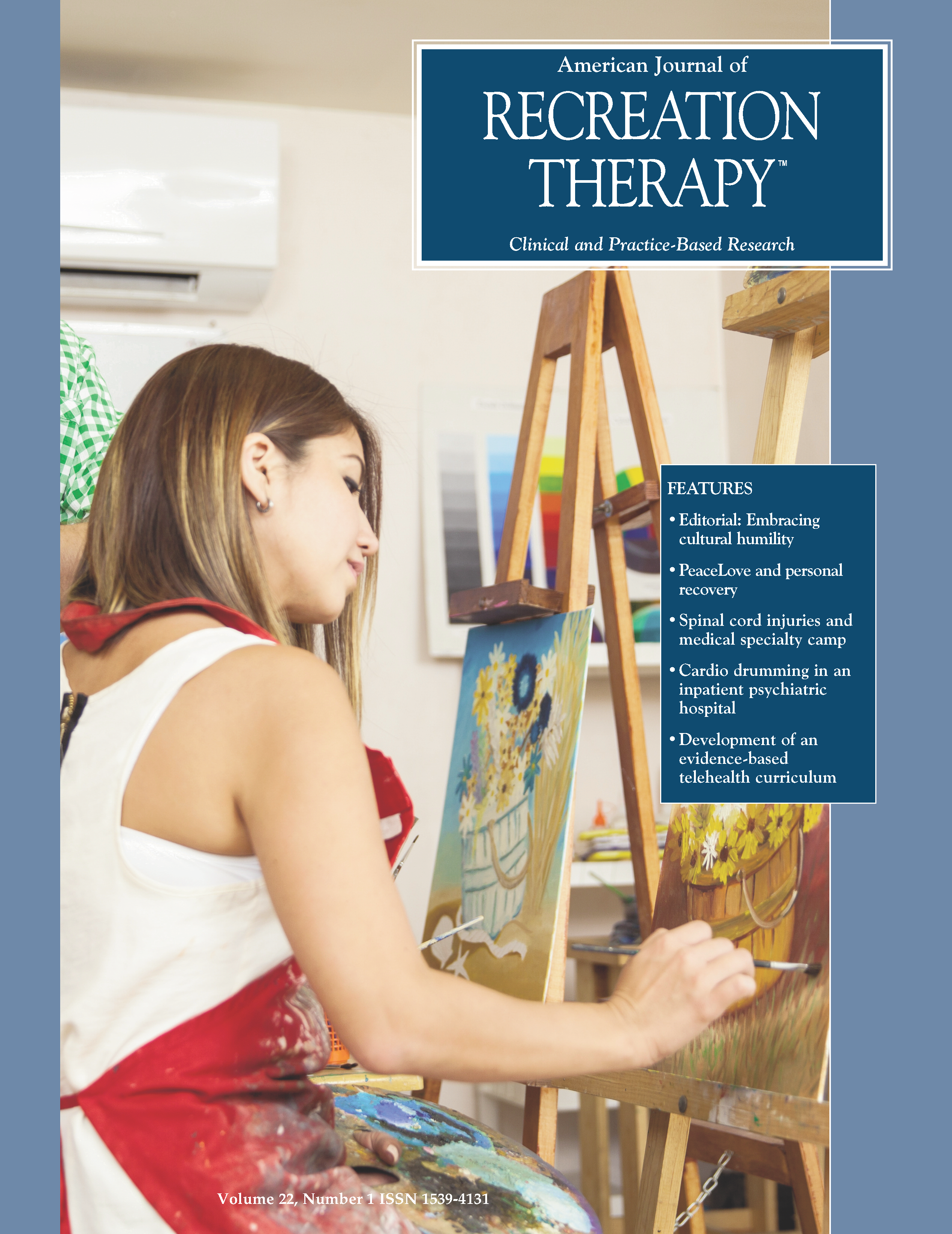Evolving beyond cultural competence and embracing cultural humility
DOI:
https://doi.org/10.5055/ajrt.2023.0274Keywords:
equity, diversity, inclusion, recreational therapyAbstract
Equity, diversity, and inclusion (EDI) initiatives are receiving heightened attention in the higher education and healthcare arenas. Such endeavors often emphasize the importance of using current best practices for developing individual and agency-wide EDI-promoting skills, attitudes, and beliefs. The Recreational Therapy (RT) profession has a history of supporting EDI initiatives, frequently focusing on ways students and therapists can develop cultural competence and become culturally competent practitioners. However, in reviewing current EDI literature, trends, and practices, we have concluded it is time for a paradigm shift in the profession. We call upon our RT colleagues to evolve beyond a focus on cultural competence and embrace EDI efforts that promote cultural humility.
References
Brottman MR, Char DM, Hattori RA, et al.: Toward cultural competency in health care: A scoping review of the diversity and inclusion education literature. Acad Med. 2020; 95(5): 803-813. DOI: https://doi.org/10.1097/ACM.0000000000002995.
Fuentes M, Zelaya D, Madsen J: Rethinking the course syllabus: Considerations for promoting equity, diversity, and inclusion. Teach Psychol. 2021; 48(1): 69-79. DOI: https://doi.org.10.1177/0098628320959979.
Bakken S: Toward diversity, equity, and inclusion in informatics, health care, and society. JAMIA. 2020; 27(11): 1639-1640. DOI: https://doi.org/10.1093/jamia/ocaa265.
Barnett RM: Leading with meaning: Why diversity, equity, and inclusion matters in US higher education. Perspect Educ. 2020; 38(2): 20-35. DOI: https//doi.org/10.1882/2519593X/pie.v38.12.02.
Morrison V, Hauch R, Perez E, et al.: Diversity, equity, and inclusion in nursing: The pathway to excellence framework alignment. Nurs Admin Q. 2021; 45(4): 311-323. DOI: https://doi.org/10.1097/NAQ.0000000000000494.
Waling A, Roffee JA: Supporting LGBTIQ+ students in higher education in Australia: Diversity, inclusion and visibility. Health Educ J. 2018; 77(6): 667-679. DOI: https://doi.org/10.1177/0017896918762233.
Blair D, Coyle C: An examination of multicultural competencies of entry-level Certified Therapeutic Recreation Specialists. Ther Recreation J. 2005; 39: 139-157.
Dieser R: A call to the profession: Cross-cultural competence and learning from a sister profession. Ther Recreation J. 2021; 55(4): 369-383. DOI: https://doi.org/10.18666/TRJ-2021-V55-I4-10955.
Kim J, King M, Park J: Culturally competent recreation therapy: Individualism and collectivism. Am J Recreat Ther. 2009; 8(2): 17-21.
Peregoy J, Dieser R: Multiculturalism in therapeutic recreation: Living in hamlets. Ther Recreation J. 1997; 32(3): 173-188.
Sheldon K, Dattilo J: Multiculturalism in therapeutic recreation: Terminology clarification and practical suggestions. Ther Recreation J. 1997; 32(3): 148-159.
Stone CF: Exploring the cultural competencies of certified therapeutic recreation specialists: Implications for education and training. Ther Recreation J. 2003; 42(2): 106-107.
Gollust SE, Cunningham BA, Bokhour BG, et al.: What causes racial health care disparities? A mixed-methods study reveals variability in how health care providers perceive causal attributions. Inquiry. 2018; 55: 1-11. DOI: 10.1177/0046958018762840.
Austin DR: Therapeutic recreation processes and techniques: Evidence-based recreational therapy (8th ed.). Champaign, IL: Sagamore Venture., 2018.
Agner J: Moving from cultural competence to cultural humility in occupational therapy: A paradigm shift. Am J Occup Ther. 2020; 74(4): 1-7.DOI: https://doi.org/10.5014/ajot.2020.038067.
Charleston L: Cross-cultural headache care within the United States: Speaking the unspoken. Headache. 2020; 60: 1832-1836. DOI: https://doi.org/10.1111/head.13878.
Berger JT, Miller DR: Health disparities, systemic racism, and failures of cultural competence. Am J Bioeth. 2021; 21(9): 4–10. DOI: https://doi.org/10.1080/15265161.2021.1915411.
Lekas HM, Pahl K, Lewis CF: Rethinking cultural competence: Shifting to cultural humility. Health Serv Insights. 2020; 13. DOI: https://doi.org/10.1177/1178632920970580.
Alizadeh S, Chevan, M: Cultural competence dimensions and outcomes: A systematic review of the literature. Health Soc Care Community. 2016; 24(6): e117-e130. DOI: https://doi.org/10.1111/hsc.12293.
Chavez V: Cultural humility: Reflections and relevance for CBPR. In Wallerstein N, Duran B, Oetzel J, et al. (eds): Community-based participatory research for health: Advancing Social and Health Equity (3rd ed.). Hoboken, NJ: Jossey-Bass, 2018, pp. 357-362.
Murray-Garcia J, Tervalon M: The concept of cultural humility. Health Aff. 2014; 33(7): 1303. DOI: https://doi.org/10.1377/hlthaff.2014.0564.
Green-Monton E, Minkler M: Cultural competence or cultural humility? Moving beyond the debate. Health Promot Pract. 2020; 21(1): 142-145. DOI: https//10.1177/1524839919884912.
Allwright K, Goldie C, Almost J, et al.: Fostering positive spaces in public health using a cultural humility approach. Public Health Nurs. 2019; 36(4): 551–556. DOI: https://doi.org/10.1111/phn.12613.
Tervalon M, Murray-Garcia J: Cultural humility versus cultural competence: A critical distinction in defining physician training outcomes in multicultural education. J Health Care Poor Underserved. 1998; 9(2): 117-125. DOI: https://doi.org/10.1353/hpu.2010.0233.
Foronda C, Baptiste D, Reinholdt M, et al.: Cultural humility: A concept analysis. J Transcul Nurs. 2016; 27(3): 210-217. DOI: https://doi.org/10.1177/1043659615592677.
Hughes V, Delva S, Nkimbeng M, et al.: Not missing the opportunity: Strategies to promote cultural humility among future nursing faculty. J Prof Nurs. 2020; 36(1): 28-33. DOI:
https://doi.org/10.1016/j.profnurs.2019.06.005.
Hook JN, Davis DE, Owen J, et al.: Cultural humility: Measuring openness to culturally diverse clients. J Couns Psychol. 2013; 60(3), 353-366. DOI: https://doi.org/10.1037/a0032595.
Stubbe DE: Practicing cultural competence and cultural humility in the care of diverse patients. Focus. 2020; 8(1): 49-51. DOI: https://doi.org/10.1176/appi.focus.20190041.
Published
How to Cite
Issue
Section
License
Copyright 2000-2025, Weston Medical Publishing, LLC and American Journal of Recreation Therapy. All Rights Reserved.


